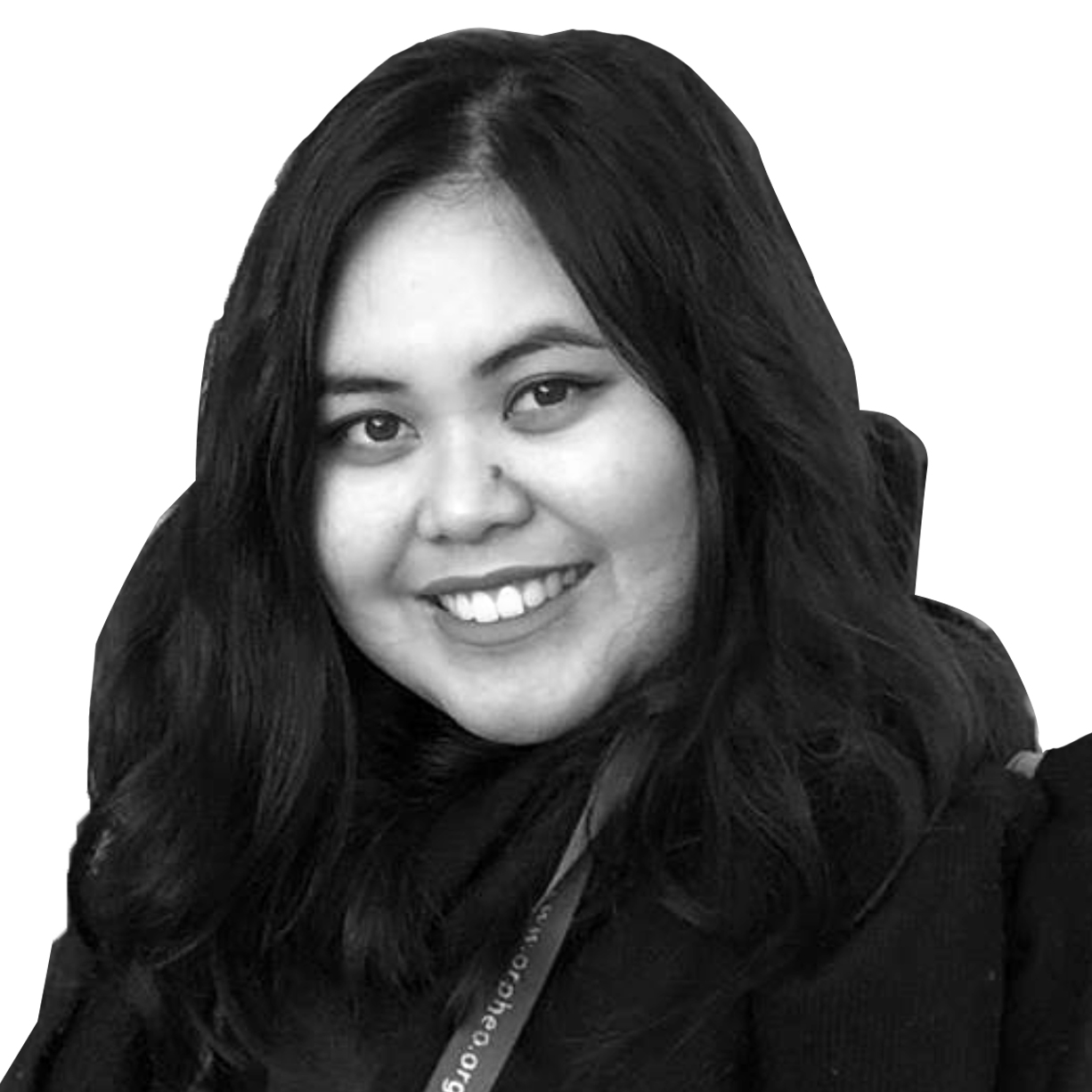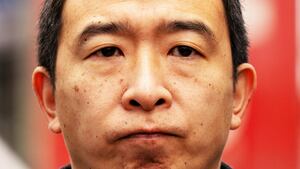Suddenly Andrew Yang, who introduced himself to America by making Asian “jokes” and playing off of stereotypes as a presidential candidate, is leaning into his Asian American identity as the son of immigrants while running for mayor of ethnically diverse New York City.
The contrast between the two campaigns is stark, even as he’s used his identity as a prop in both of them; he’s just gone from delivering stereotypical jokes to self-righteously condemning them as it has suited his political needs.
Speaking as a Filipina American: If this is how we’re supposed to get more Asian American representation in politics, I don’t want it.
Asian jokes were a big part of his presidential appeal, as he christened himself America’s “MATH Guy” while trying to convince Americans that he was the “right” sort of a one-dimensional stereotype. “The opposite of Donald Trump is an Asian man who likes math,” was a favorite zinger of his on the trail. “I am Asian, so I know a lot of doctors,” he said in one of the debates. “I’m Asian, so I love tests,” he said in an interview with Politico. Ha ha. Hilarious. I can barely contain myself.
I guess if something like your identity makes you so uncomfortable, what better way than to relentlessly mock it on a national stage? There’s definitely nothing more comforting for white people than a guy who prefers to just own the racist stereotypes himself in order to entertain the swath of America with an affinity for racist comedy. When SNL’s Shane Gillis called him a “Jew Ch-nk,” Yang simply forgave him.
And as Trump raved about “the China virus,” even amid a wave of attacks on Asian Americans, Yang wrote an op-ed titled “We are not the virus, but we can be part of the solution,” where he said that “We Asian Americans need to embrace and show our American-ness in ways we never have before. We need to step up, help our neighbors, donate gear, vote, wear red white and blue, volunteer, fund aid organizations, and do everything in our power to accelerate the end of this crisis. We should show without a shadow of a doubt that we are Americans who will do our part for our country in this time of need.”
Those are my emphases, in case it wasn’t clear what he was saying about how Asians “need” to act more “American.” He drove that painful point home in that same piece by writing about how “Japanese Americans volunteered for military duty at the highest possible levels to demonstrate that they were Americans” without so much as a mention of the internment camps so many of them spent the war confined in.
For the Yang Gang, his “outsider” identity was a breath of fresh air, something different from the establishment. But over the course of his presidential campaign, it never really seemed to me that Yang’s identity as an Asian man was treated by himself or his supporters like a real and lived experience. Rather, his Asian identity was reduced to the punchline of campaign jokes and a checkbox for diversity in a society where being a minority is viewed by people in power as a “perk” (affirmative action and built-in wokeness included!)–never mind the hundreds of years of oppression, prejudice, and genocide inflicted upon marginalized communities.
Pandering to that “forgotten” middle-class white voter in Middle America (being liked by Trump supporters and independents alike was a major talking point for the candidate), Yang became the very embodiment of the “model minority”—the only acceptable marginalized person, complete with abnormally large bootstraps to soothe the sting of systemic white oppression. Born in Schenectady, New York, to Taiwanese scholars who immigrated to study at UC Berkeley in the 1960s, Yang grew up a part of the East Coast elite, attended the highly prestigious Phillips Exeter Academy, then went on to graduate from an equally prestigious Ivy League, Brown University, before ending his educational career at Columbia Law School. This is the stereotypical Asian American dream.
The model minority trope takes the experience above and slaps it onto Asian Americans in a one-size-fits-all approach, sprinkled with that quiet, timid, hard-working attitude. Yang’s former antipathy towards politics and his entrepreneurial (code word for anti-communist) spirit are obviously just a bonus. All of these stereotypes are rooted in historic oppression against Asian immigrants in the United States; political invisibility was the result of being disposable labor, possessing the face of an “enemy” and being continually labeled as having “subversive” affiliations or loyalties.
Whether it is for success or survival, Yang has basked in his proximity to whiteness, and the discomfort he seems to feel about being Asian (how he was bullied, how people looked at him in public, how he felt about jokes about his masculinity) feels palpable in every interview he’s given that touches upon his “Asianness.”
Of course, Yang’s identity isn’t his fault—by virtue of his birth he just happens to identify with the most widely held stereotype of Asians, a space that holds a hegemony over other Asian experiences in the United States. But in two decades living in New York, his vote for himself will be the first one he has ever cast for a mayor—jumping into the race only after capitalizing on the name recognition he earned with his presidential run. That prior indifference towards local elections feels like the behavior of someone who has felt privileged enough not to feel directly affected by politics or care about the role local governance has on his community.
When asked, in a profile for Politico, why he had never really discussed the issue of Asian American identity in depth before, Yang answered: “Mostly… because no one asked.”
Really? Any politician worth his or her salt answers the questions they want to, rather than the ones they are asked. And now that he’s running for mayor, Yang has often been much more eager to talk about his Asian American identity (although his campaign did not respond to a request for comment for this story).
In fact, Yang has grown a kind of savior complex, becoming a champion for Asian Americans, condemning racist stereotypes and centering himself in the fight against the rise of anti-Asian hate crimes—albeit by supporting a larger police presence in majority-minority areas that disproportionately hurts Black and brown communities that are usually already overpoliced.
The day after Yang’s “iconic” interview with Ziwe—in which he said that Times Square was his favorite subway station and, asked to name his “favorite” racial stereotype, volunteered a riff about Asians—the New York Daily News published a cartoon portraying Yang as a slanty-eyed tourist coming out of the Times Square station. This time, he didn’t write about the need to embrace his “Americanness” but used the controversy, which came amid an ongoing wave of attacks against Asians in New York City, to finally condemn racist stereotypes about Asians even as he also tried to use the problem of anti-Asian hate crimes to try and insulate himself from fair questions in the press about his disinterest in local politics until now and his family’s decision to leave the city for their second home in the Hudson Valley during the worst of the pandemic.
“To paint me in the media as a perpetual foreigner to this city is wrong and subtly approves racism at a time when people are being beaten on the street on the basis of who they are,” he wrote. “Everytime you say that I’m not a real New Yorker, you’re telling another Asian American that they don’t belong.”
It goes without saying that the stereotype of the “perpetual foreigner” is a menace to the Asian American community because it questions our right to belong and to be considered, much like the “model minority” stereotype has impeded our community from receiving the economic assistance it needs. But it’s hard to accept a statement condemning stereotypes from a politician who’s used them throughout his brief political career.
While his team considered his interview with Ziwe a political win, his answers made it clear that he doesn’t have a real understanding of why his former strategy to “own” Asian stereotypes was wrong. He didn’t so much as pause before saying “I’ve gotta stick to the Asian ones” and then talking about bubble tea and fearing their parents, picking the “right” ones that wouldn’t make any voters mad. What he didn’t do was simply reject the idea of a favorite stereotype. Trafficking in meaningless tropes about his identity when we are constantly scraping for more, better, and real political representation that can have an actual impact on our communities is much less “lighthearted” and “benign” than Yang seems to think it is. And it’s definitely not funny. Being Asian American isn’t a joke, it’s a reality.
My question is: When Asian hate crimes and taunts like the “kung flu” leave the news cycle and this mayoral race is finished, will Andrew Yang still champion his “Asianness,” or ours?








